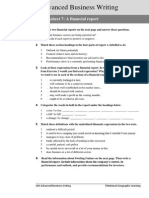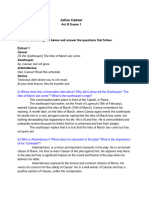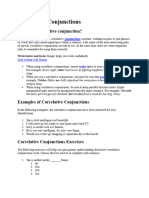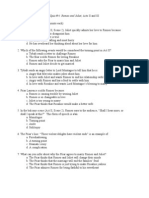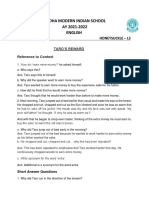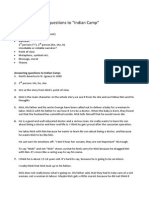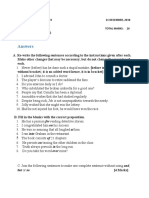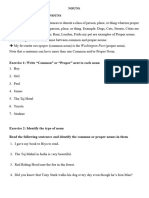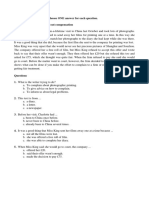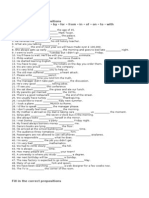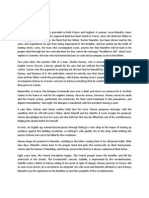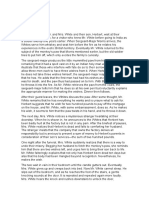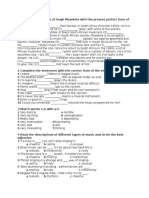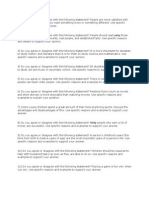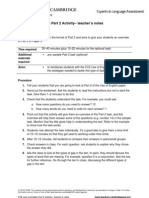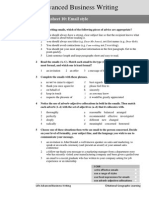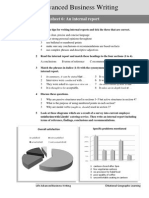0%(1)0% found this document useful (1 vote)
559 viewsRelative Clause Test
Relative Clause Test
Uploaded by
marhulThe document contains an English grammar test on relative pronouns and clauses. It includes questions testing the use of relative pronouns in sentences, combining sentences using relative clauses, and identifying defining and non-defining relative clauses. The test covers key concepts in using relative pronouns and clauses to combine sentences and add information.
Copyright:
© All Rights Reserved
Available Formats
Download as DOC, PDF, TXT or read online from Scribd
Relative Clause Test
Relative Clause Test
Uploaded by
marhul0%(1)0% found this document useful (1 vote)
559 views3 pagesThe document contains an English grammar test on relative pronouns and clauses. It includes questions testing the use of relative pronouns in sentences, combining sentences using relative clauses, and identifying defining and non-defining relative clauses. The test covers key concepts in using relative pronouns and clauses to combine sentences and add information.
Original Description:
grammar
Copyright
© © All Rights Reserved
Available Formats
DOC, PDF, TXT or read online from Scribd
Share this document
Did you find this document useful?
Is this content inappropriate?
The document contains an English grammar test on relative pronouns and clauses. It includes questions testing the use of relative pronouns in sentences, combining sentences using relative clauses, and identifying defining and non-defining relative clauses. The test covers key concepts in using relative pronouns and clauses to combine sentences and add information.
Copyright:
© All Rights Reserved
Available Formats
Download as DOC, PDF, TXT or read online from Scribd
Download as doc, pdf, or txt
0%(1)0% found this document useful (1 vote)
559 views3 pagesRelative Clause Test
Relative Clause Test
Uploaded by
marhulThe document contains an English grammar test on relative pronouns and clauses. It includes questions testing the use of relative pronouns in sentences, combining sentences using relative clauses, and identifying defining and non-defining relative clauses. The test covers key concepts in using relative pronouns and clauses to combine sentences and add information.
Copyright:
© All Rights Reserved
Available Formats
Download as DOC, PDF, TXT or read online from Scribd
Download as doc, pdf, or txt
You are on page 1of 3
At a glance
Powered by AI
The key takeaways are about using relative pronouns and clauses, as well as the difference between defining and non-defining relative clauses. It also discusses contact clauses and how to combine sentences.
Relative pronouns are words like who, whom, whose, which, and that. They are used to join two clauses and refer back to a noun or pronoun in an earlier clause. Examples of their use are provided.
Defining relative clauses identify a specific noun, while non-defining clauses provide extra identifying information about a noun. Commas are used differently with each type of clause.
Test: Relative Pronouns and Clauses
Choose the correct relative pronoun or relative adverb.
1. The woman _________ is sitting at the desk is Mr Winter's
secretary.
2. I cannot remember the reason _________he wanted us to leave.
3. Jane, _________mother is a physician, is very good at biology.
4. She didnt see the snake _________was lying on the ground.
5. Do you know the shop _________Andrew picked me up?
Combine the sentences with relative clauses. (Decide
whether to use commas or not.)
1. A monk is a man. The man has devoted his life to God.
A monk _________
2. I have one black cat. His name is Blacky.
I have _________
3. A herbivore is an animal. The animal feeds upon vegetation.
A herbivore _________
4. Carol plays the piano brilliantly. She is only 9 years old.
Carol _________
5. Sydney is the largest Australian city. It is not the capital of
Australia.
Sydney _________
Combine the sentences with contact clauses.
1. We ordered a book. It was very expensive.
_________
2. You are sitting on a bench. The paint on the bench is still wet.
_________
3. The photographer could not develop the pictures. I had taken
them in Australia.
_________
4. One of the bins smells awful. You havent emptied the bin for 3
weeks.
_________
5. They are singing a song. I dont know the song.
_________
Combine the sentences with relative clauses or contact
clauses. Use contact clauses where possible. (Decide
whether to use commas or not.)
1. The city seems to be abandoned. It is usually crowded with
people.
_________
2. You made an offer. We cannot accept it.
We _________
3. A midwife is a woman. She assists other women in childbirth.
A woman _________
4. Three youngsters were arrested by the police. They had
committed criminal offences.
The police _________
5. The World Wide Web has become an essential part of our
lives. It was invented by Tim Berners-Lee.
Tim Berners-Lee _________
Decide whether the following clauses are defining or nondefining clauses. Insert commas where necessary:
1. The car which was a rare sports coupe was built in 1966.
2. We invited the boy who Tom had met the week before to the
party.
3. Our friends who we met at university are coming to visit next
week.
4. That is the building where they shot the film 'Vanilla Sky'.
5. Mr Jackson whose son also goes to this school will be
attending the party next weekend.
6. The author's latest book which has become a bestseller is
about two children in Jamaica.
Write three non-defining and three defining clauses:
_____________________________________________________________________
_____________________________________________________________________
_____________________________________________________________________
_____________________________________________________________________
_____________________________________________________________________
_____________________________________________________________________
_____________________________________________________________________
_____________________________________________________________________
_____________________________________________________________________
_____________________________________________________________________
Sources:
http://esl.about.com/cs/teachingresources/a/blnondefine.htm
http://www.ego4u.com/en/cram-up/tests/relative-clauses-4
You might also like
- The Giver Quiz 7-8Document2 pagesThe Giver Quiz 7-8roxanaietiNo ratings yet
- Grammar Revision Mixed Exercises KeyDocument3 pagesGrammar Revision Mixed Exercises KeyyogibaNo ratings yet
- Demo Euphemism WorksheetDocument1 pageDemo Euphemism WorksheetmrkennygoitaNo ratings yet
- Advanced Business Writing: Worksheet 7: A Financial ReportDocument2 pagesAdvanced Business Writing: Worksheet 7: A Financial ReportmarhulNo ratings yet
- The Jungle BookDocument11 pagesThe Jungle BookJulieta Lumapas OdtojanNo ratings yet
- Last Leaf TestDocument8 pagesLast Leaf TesttamtikoNo ratings yet
- 5.exercises On Verb Tenses With AnswersDocument6 pages5.exercises On Verb Tenses With Answersabril iñon rukavinaNo ratings yet
- Quiz On Sentence TypesDocument3 pagesQuiz On Sentence TypesYuvaNeswaran100% (1)
- Tkmquestions by Each ChapterDocument12 pagesTkmquestions by Each Chapterapi-194333853No ratings yet
- Choose The Correct AnswerDocument4 pagesChoose The Correct AnswerMai NatourNo ratings yet
- The Frog and The NightingaleDocument4 pagesThe Frog and The Nightingaleapi-19776105100% (2)
- SCCX PDFDocument2 pagesSCCX PDFCarlos RodríguezNo ratings yet
- Active and Passive Voice Exercise: AnswersDocument11 pagesActive and Passive Voice Exercise: AnswersSaif UllahNo ratings yet
- Add An Apostrophe and "S" ('S) To Make The Possessives in The Following SentencesDocument2 pagesAdd An Apostrophe and "S" ('S) To Make The Possessives in The Following SentencesJanice Alvarez Gacusan AbbasNo ratings yet
- Adverb ExerciseDocument3 pagesAdverb ExerciseMico WooNo ratings yet
- Americanah Chapter 1 QuizDocument1 pageAmericanah Chapter 1 QuizMattNo ratings yet
- Julius Caesar Act 3 Scene 1Document29 pagesJulius Caesar Act 3 Scene 1gangadharabhatlarahulNo ratings yet
- Correlative ConjunctionsDocument4 pagesCorrelative ConjunctionsThe PrinceNo ratings yet
- Conditional Exercises MixedDocument2 pagesConditional Exercises MixedmarhulNo ratings yet
- Relative Clauses ExercisesDocument2 pagesRelative Clauses ExercisesIsaac BurgosNo ratings yet
- Romeo & Juliet Acts II and III QuizDocument3 pagesRomeo & Juliet Acts II and III QuizNalin Paul NeedhamNo ratings yet
- Taro's RewardDocument2 pagesTaro's Rewardmohaddisa100% (1)
- A Slumber Did My Spirit Seal by William Wordsworth NotesDocument3 pagesA Slumber Did My Spirit Seal by William Wordsworth NotesAshwanth MNo ratings yet
- Descriptive Writing WorksheetDocument2 pagesDescriptive Writing WorksheetAyien Taib100% (1)
- Folklore Exit TicketDocument2 pagesFolklore Exit TicketlfahrenholzNo ratings yet
- Analyze of Indian CampDocument2 pagesAnalyze of Indian CampLillyjensenNo ratings yet
- Worksheet 3 Grammar AnswersDocument3 pagesWorksheet 3 Grammar AnswersKeshav AgarwallaNo ratings yet
- Story WritingDocument4 pagesStory WritingrachnatandonNo ratings yet
- Landlady QuizDocument3 pagesLandlady QuizNancy Naiem BashirNo ratings yet
- Imagery and Structure in Nadine Gordimer S Once Upon A TimeDocument15 pagesImagery and Structure in Nadine Gordimer S Once Upon A Timekamran imtiazNo ratings yet
- Quantifiers and Demonstratives (Students)Document2 pagesQuantifiers and Demonstratives (Students)Dennis CunninghamNo ratings yet
- A Christmas Carol Quiz 1Document2 pagesA Christmas Carol Quiz 1Aya Abu HamdiehNo ratings yet
- Underline The Prepositions in The Sentences Given BelowDocument5 pagesUnderline The Prepositions in The Sentences Given BelowPirai Nuthal Selvi100% (1)
- Fill in The Blanks With The Correct Word From The Brackets: Section D - GrammarDocument9 pagesFill in The Blanks With The Correct Word From The Brackets: Section D - GrammarThēé Kïsïī Grændfæthêé IINo ratings yet
- Pronoun and Its TypesDocument9 pagesPronoun and Its TypesRosita BagusNo ratings yet
- Julius Caesar Acts IV-V Summary and Literary TermsDocument2 pagesJulius Caesar Acts IV-V Summary and Literary TermsNekoda SamuelNo ratings yet
- Common & Proper NounsDocument4 pagesCommon & Proper NounsNeenaNo ratings yet
- Clause WorksheetDocument4 pagesClause WorksheetMalyn EmmaNo ratings yet
- Quiz Conditional SentencesDocument3 pagesQuiz Conditional SentencesAlexandra SpatariuNo ratings yet
- B1 - Reading - Comprehension 4 PDFDocument1 pageB1 - Reading - Comprehension 4 PDFCarolina Lopez100% (1)
- 3) To Kill A Mockingbird Chapter 1,2Document22 pages3) To Kill A Mockingbird Chapter 1,2Dinishi MerrionNo ratings yet
- Class Xii General English Question Bank Section-C: 1. The School For SymapthyDocument10 pagesClass Xii General English Question Bank Section-C: 1. The School For SymapthyShivam TonyNo ratings yet
- Instituto de Lenguas de La Universidad Distrital - IludDocument2 pagesInstituto de Lenguas de La Universidad Distrital - IludDiego Morales100% (1)
- Prepositions: Fill in The Correct Prepositions About - at - by - For - From - in - of - On - To - WithDocument2 pagesPrepositions: Fill in The Correct Prepositions About - at - by - For - From - in - of - On - To - Withr_de_rumba6No ratings yet
- UntitledDocument6 pagesUntitledapi-233604231No ratings yet
- Impersonal PassiveDocument6 pagesImpersonal Passiveandreeagabriela28No ratings yet
- Oliver-Twist-chapters 5-6-7-8Document19 pagesOliver-Twist-chapters 5-6-7-8Bee Fee0% (1)
- A Tale of Two CitiesDocument3 pagesA Tale of Two CitiesLady Christine Cruz0% (1)
- Themes in The PedestrianDocument5 pagesThemes in The PedestrianComment BusterNo ratings yet
- Conditionals - WorksheetsDocument3 pagesConditionals - WorksheetsConsiderCaseyNo ratings yet
- Fill in The Blanks With The Correct Forms of The VerbsDocument2 pagesFill in The Blanks With The Correct Forms of The VerbsAnies S. RiniNo ratings yet
- Read The Poem, Unfolding Bud, by Naoshi Koriyama, and Answer The Questions Below in Not More Than Three Sentences. Underline The Keywords and IdeasDocument2 pagesRead The Poem, Unfolding Bud, by Naoshi Koriyama, and Answer The Questions Below in Not More Than Three Sentences. Underline The Keywords and Ideaskristine torresNo ratings yet
- Relative Clause 8.10 2Document4 pagesRelative Clause 8.10 2Nguyên NguyễnNo ratings yet
- Prepositions Prep 1Document8 pagesPrepositions Prep 1ramukolakiNo ratings yet
- Three QuestionsDocument11 pagesThree QuestionsAnushka UpadhyayNo ratings yet
- The Monkey's Paw QUESTIONSDocument2 pagesThe Monkey's Paw QUESTIONSBelen TrovatelliNo ratings yet
- English 1 The Scarlet Ibis Essay PromptDocument4 pagesEnglish 1 The Scarlet Ibis Essay Promptapi-332181833No ratings yet
- Treasure Island WorksheetDocument2 pagesTreasure Island WorksheetRaximov Abduquddus100% (1)
- The Mill on the Floss by George Eliot (Book Analysis): Detailed Summary, Analysis and Reading GuideFrom EverandThe Mill on the Floss by George Eliot (Book Analysis): Detailed Summary, Analysis and Reading GuideNo ratings yet
- Puncture Ensuing Chronic Lodged Stray Swamp Gruelling Stay Put Dazed Vow Riddle Boost Curb Plea CeaseDocument1 pagePuncture Ensuing Chronic Lodged Stray Swamp Gruelling Stay Put Dazed Vow Riddle Boost Curb Plea CeasemarhulNo ratings yet
- Life Inter 2 LekciaDocument4 pagesLife Inter 2 Lekciamarhul100% (2)
- Test Telekom StredaDocument2 pagesTest Telekom StredamarhulNo ratings yet
- A First Time For EverybodyDocument1 pageA First Time For EverybodymarhulNo ratings yet
- Conditional Exercises MixedDocument2 pagesConditional Exercises MixedmarhulNo ratings yet
- TOEFL TopicsDocument5 pagesTOEFL TopicsKatrina BaranNo ratings yet
- PicturesDocument2 pagesPicturesmarhulNo ratings yet
- Upper Intermediate Business Writing: Worksheet 1: Formal and Informal CorrespondenceDocument2 pagesUpper Intermediate Business Writing: Worksheet 1: Formal and Informal CorrespondencemarhulNo ratings yet
- TestDocument2 pagesTestmarhulNo ratings yet
- JobsDocument2 pagesJobsmarhulNo ratings yet
- 'S Command of The Eastern ProvincesDocument1 page'S Command of The Eastern ProvincesmarhulNo ratings yet
- Advanced Business Writing: Worksheet 11: Emails To A ClientDocument2 pagesAdvanced Business Writing: Worksheet 11: Emails To A ClientmarhulNo ratings yet
- Fce Use of English Part 2Document4 pagesFce Use of English Part 2marhulNo ratings yet
- Advanced Business Writing: Worksheet 9: A Mission StatementDocument2 pagesAdvanced Business Writing: Worksheet 9: A Mission StatementmarhulNo ratings yet
- Advanced Business Writing: Worksheet 10: Email StyleDocument2 pagesAdvanced Business Writing: Worksheet 10: Email Stylemarhul100% (1)
- Upper Intermediate Business Writing: Worksheet 1: Formal and Informal CorrespondenceDocument2 pagesUpper Intermediate Business Writing: Worksheet 1: Formal and Informal CorrespondencemarhulNo ratings yet
- Advanced Business Writing: Worksheet 8: A NewsletterDocument2 pagesAdvanced Business Writing: Worksheet 8: A NewslettermarhulNo ratings yet
- Advanced Business Writing: Worksheet 6: An Internal ReportDocument2 pagesAdvanced Business Writing: Worksheet 6: An Internal ReportmarhulNo ratings yet



